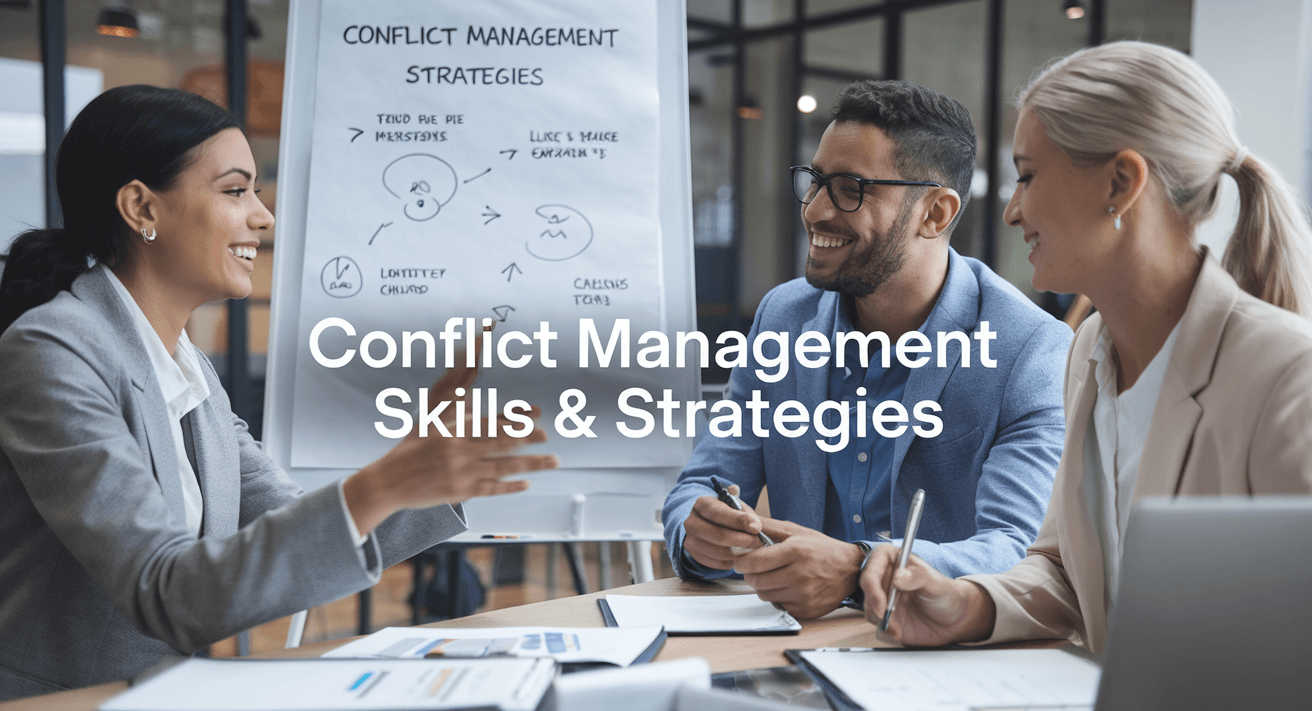In any high-pressure organizational landscape conflicts are not just an occasional inconvenience but an inevitable scenario even though, we all know that only a conflict-free environment can foster team dynamics and improve productivity. Conflicts can occur due to a multitude of reasons like clashing personalities or competition for resources. Yet, it can escalate rapidly if not handled effectively. For this reason, mastering conflict management is predominant. In this blog, we will explore how effective conflict management skills can transform disputes into opportunities for growth and collaboration. This is possible only by understanding its strategies and attaining relevant skills.

Jump ahead to
What is Conflict Management?
Conflict Management is a process of recognizing and addressing disputes between two parties constructively and effectively at appropriate times. It definitely, involves certain skills, techniques, and strategies. Successful Conflict Management is not avoiding conflicts; rather, it is a purposeful process of finding a balance where both parties feel valued. This can lead to mutual boon.
Essential Skills for Conflict Resolution
Now let’s peep into the substance skills and traits an individual should own to preside over workplace disputes.
Active Listening
Active Listening is being attentive with full concentration and understanding what another person has to say while responding to and remembering the actual words. Here, it is important to know the emotions behind their speech to interact genuinely. In fact, this is a cornerstone of any dispute management. During listening one can ask queries to understand the underlying emotions driving the conflict. This is imperative to resolve the disputes swiftly.
Communication
Open communication can play a pivotal role in settling conflicts, especially ego clashes. This is more weighty after managing a conflict as it can relax their mental condition and help them to go back to normal. This nurtures tidy and long-term relationships. While working in a challenging context this skill can be efficacious.
Problem-Solving
Problem-solving skill is the ability to understand the root cause of the conflict, generate potential solutions, and assess the options to find a strategic resolution. For instance, if resource allocation is an issue between two teams. The fundamental cause is limited resources. By efficiently brainstorming the solutions, the problem can be resolved promptly.
Emotional Intelligence
Emotional Intelligence involves recognizing, comprehending, and managing our own emotions together with others. Through this, we can constructively react to others’ concerns. High emotional intelligence aids us in navigating through conflicts calmly and in a composed way. Subsequently, it helps us to communicate with the parties involved in the conflict without provoking them. This can eradicate the situations where problems can escalate.
Patience
This skill is crucial because human beings always hold their stance while involved in any dispute. The assertiveness of parties makes the dispute resolution task hectic. Meanwhile, it is factual that a dispute can be solved right away when we take the time to listen and communicate tactically with empathy and patience.
Empathy
A proactive response to others’ problems is not a facile task. It can be done only if we can understand their viewpoints from their angle. Empathy is the capability level to understand and share the feelings of others. Owing to that, we have to put ourselves in other people’s shoes to know their perspective. This should be nonjudgemental and honest. This skill is best to deal some unmanageable circumstances.
Impartiality
Being impartial can keep any challenging situations of conflict at arm’s length. The desperate tips to remember here are to be mindful of our speech tone and that it is unnecessary to involve the wounds and issues that happened in the past in any prevailing conflict. To be skillful in this trait may seem challenging but at the same time, it can resolve many conflicts at peace.
Negotiation
This is a process of arriving at a compromise with all parties involved in a conflict. This is also a hard-earned skill possessed by many leaders and professionals in managerial positions. The customary aim while negotiating is that it should satisfy everyone and it should be bias-free.
Conflict to Consensus: Conflict Resolution Strategies
Thomas-Kilmann Model of Conflict Resolution provides an effective framework of strategies for addressing conflicts. The model categorizes the strategies into two, assertive and cooperative. If we use the right strategy at the right time the disputes can be solved without hassle.
Now, we will dig deep into these strategies:
Collaboration
The collaborative style involves cooperative and assertive styles in approaching people during a dispute. It involves working together with all the individuals to bring solutions to their concerns that are satisfying and resolute. In the sphere of complex conflicts, this can be assisting.
Compromise
This is prevalent where all parties involved in the dispute are ready to give up something to reach a mutually acceptable solution. This can be implemented when time is of the essence or the compromise is the only solution.
Accommodation
This is seen where the issue is more important for one party than the other. This is a style where people are unassertive. Moreover, it can be executed only if being accommodative does not harm the overall goal and brings harmony.
Avoidance
An assertive style of ignoring that the conflict is happening. Certainly, there are situations when emotions are too high or the issue is trivial. This strategy can be used sparingly and only in unique situations where we feel it is an optimal solution.
Competition
The competing style of dispute management is assertive and an intense approach to solving jeopardized situations. Here, a group or an individual pursues their concerns at the expense of the other party. This can be implemented at the points where quick and decisive actions are crucial.
Some common examples of workplace conflict management
Scenario 1: Resource Allocation Conflict
Situation: When two project managers are involved in a dispute over a shared resource allocation. For Eg: They need to allocate a well-calibrated developer
Resolution: Here, an operations manager can facilitate a meeting for both parties and use active listening skills and negotiation skills to make them agree on a schedule that allows the two managers to access the developer at crucial times.
Scenario 2: Personal conflicts
Situation: If two team members are not going along, this leads to crisis and diminished productivity.
Resolution: It is where an operations manager should show empathy and EI to understand the bottom-line issues. After one-to-one meetings and mediated conversations, parties should agree to set boundaries and concentrate on common goals.
Training and Development of Conflict Management
Conflict Management is more of an acquired skill than an innate one. Therefore, undergoing Dealing with Difficult People Training, helps one to develop it. For this, individuals can attend workshops or seminars on the topic. They can refer to books on Conflict Management like “Negotiation and Conflict Management- A Different Perspective” by Johannes Jurgens Du Toit. Seeking out mentors or peer groups who effectively manage workplace disputes can also benefit. Yet, the optimal and foremost way to learn dispute resolution skills and strategies is to use online platforms and certification programs on Conflict Management.
Conclusion
Mastering Conflict Management is not just about keeping the situation calm but it is the process of transforming challenges into opportunities for self-development, innovation, and maintaining a team at zest. While developing this caliber and competence through experience is valuable, formal training and Conflict Management Certification can take the expertise to the next level. A well-structured course on dispute resolution can cater to proven strategies, an understanding of governing complex situations, and equips with tools to settle even the conflict at their peak.
Acquiring skills in conflict management is promising for all regardless if he is a team leader, operational manager, or product owner. Mastering skills and strategies can help to lead with confidence, sort out conflicts tactically, and foster a workplace where everyone’s voice is heard and valued. Undoubtedly, in a collaborative and positive working environment, the teams will flourish.
FAQs
What are the most common causes of workplace disputes?
At the workplace, disputes can occur for some common reasons like miscommunications, differences in working patterns, personality clashes, and unclear roles and responsibilities.
How can I resolve a conflict efficiently?
To boost effective conflict management skills practice active listening, improve emotional intelligence, and refine communication techniques. Participating in workshops or online courses and seeking optimal mentorship can advance these skills.
When should I take a third-party assistance to resolve a workplace dispute?
Seeking the help of a third party, which can be a mediator or an HR professional is advised only if the conflict is highly complex, or emotional or when initial resolution trials have failed.
Does emotional intelligence have a key role in Conflict Management?
Emotional intelligence helps in recognizing and managing our own emotions and other’s emotions. This can make us enable to navigate conflicts with empathy and composure and facilitate dispute resolutions that consider the feelings and necessities of all individuals involved.
Give some tips for conflict management.
Some tips can aid anyone involved in conflict management such as accepting conflict as natural, being calm, listening fully, analyzing the situation, using neutral language, agree to disagree.
What are the five stages of a conflict?
The five stages of a conflict are latent stage, perceived stage, felt stage, manifest, and conflict aftermath.
How do I know if I need formal training in conflict management?
If a person is frequently involved in or acts as a moderator to manage conflict and struggles can take formal training. Conflict Management Training can enhance leadership skills. Moreover, training can provide strategies, tools, and a solid understanding of conflict dynamics.



